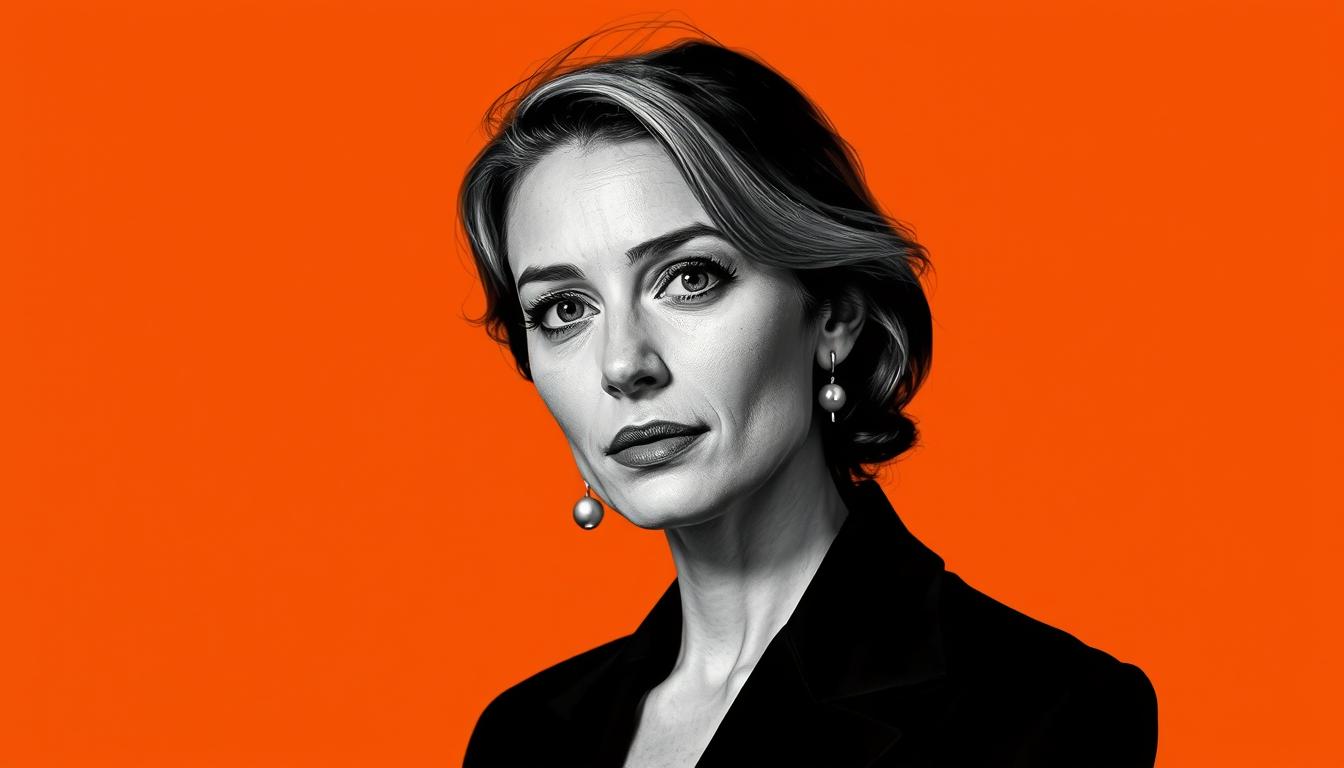In 2019, Léa Drucker claimed one of French cinema’s highest honors. She won the César Award for Best Actress for her searing performance in “Custody.” This moment cemented her status as a leading talent.
Born in Caen, Normandy, her path to the screen was shaped by rigorous training in Paris. She studied at prestigious institutions, mastering her craft from the stage up. Her career now spans over three decades.
She chooses roles with intellectual depth and emotional precision. Her work often challenges how women are portrayed in film. Directors trust her to bring complex, uncomfortable truths to life.
This actress represents a generation focused on substance. Her talent lies in a powerful combination of instinct and discipline. She builds performances that linger long after the credits roll.
A Journey Through Lea Drucker’s Iconic Career
Her journey to cinematic acclaim began on the stage. A foundation built at two of Paris’s most respected acting schools shaped her craft for decades to come.
Early Life and Theatre Foundations
Training at École de la rue Blanche and ENSATT gave her a unique toolkit. She mastered classical technique while embracing contemporary experimentation.
This dual focus served her well in the theater. For over twenty years, she tackled a vast range of roles. From the sharp wit of Molière to the psychological tension of Harold Pinter, she committed fully to each character.
Her talent was recognized early with two Molière Award nominations for Best Female Revelation. This signaled a powerful stage presence and deep emotional range.
Breakthrough Roles and Award-Winning Performances
While building her stage career, she also appeared in numerous films. Early roles in the 1990s and 2000s laid the groundwork.
Her major breakthrough arrived through collaboration with director Xavier Legrand. It started with the Oscar-nominated short film, “Just Before Losing Everything.”
This partnership culminated in the feature “Custody.” Her role as Miriam Besson was a defining moment. The performance earned her the César Award for Best Actress in 2019.
This award confirmed her commanding power. A power built on decades of rigorous work in theater and independent cinema.
In-Depth Interview Insights: Behind the Craft
Working with Catherine Breillat required a complete surrender to the director’s vision. This approach often challenged traditional acting instincts.
Approach to Challenging Roles and Directorial Collaboration
Breillat’s direction blended strict visual parameters with emotional freedom. She referenced Caravaggio paintings and classic cinema figures like Kim Novak.
This unique way of working created a fascinating dynamic on set. The director spoke during takes, her voice later removed in editing.
| Breillat’s Technique | Traditional Approach | Result on Performance |
|---|---|---|
| Visual references to art history | Psychological character analysis | Embodied, painterly quality |
| Speaking during takes | Silence during filming | Constant director-actor dialogue |
| Treating intimate scenes as stunts | Emotional immersion | Clinical precision with emotional depth |
| Restrained facial expression | Expressive performance | Unsettling ambiguity |
Embracing Emotional Nuances on Set
For intimate scenes in Last Summer, the work resembled choreographed stunts. Everything was precisely blocked and rehearsed.
Breillat’s instruction to convey everything through the eyes felt counterintuitive initially. This restraint created moral complexity for the character.
The collaboration required trusting the director’s perspective completely. Even when the approach felt uncomfortable, it unlocked new performance layers.
The Evolution of French Cinema Through Her Lens
The international film festival circuit provides a unique lens through which to view the evolution of an actor’s career and the themes they champion. It maps a journey from discovery to mastery.
For Léa Drucker, this path is marked by consistent selection for the world’s most prestigious events. Her work consistently meets the high bar set by festival curators.
Impact of Film Festivals and Critical Acclaim
Her 2025 Cannes Film Festival entry, “Case 137,” directed by Dominik Moll, is a prime example. She plays Stéphanie, an investigator probing a sensitive case from the Yellow Vest movement.
The film tackles complex themes of justice and institutional power. This marks her second collaboration with Moll, known for his psychological depth.
This festival trajectory demonstrates a clear pattern. Her projects are chosen for their artistic rigor and social relevance.
Her filmography shows a strong connection to Academy Award consideration. This table highlights key milestones on the international stage.
| Film Title | Festival / Award Body | Recognition Level |
|---|---|---|
| Just Before Losing Everything | Academy Awards | Nominated, Best Live Action Short Film (2014) |
| Two of Us | Academy Awards | Shortlisted, Best International Feature (2020) |
| Close | Academy Awards | Nominated, Best International Feature (2023) |
| Last Summer | New York Film Festival | Official Selection |
This consistent presence over the years builds a reputation. It establishes an actress who interprets contemporary anxieties with honesty.
Her work bridges art-house cinema and accessible storytelling. It makes difficult content engaging for a global audience without losing its intellectual edge.
Lea Drucker in Contemporary Film & Television
A new chapter unfolded for the performer, moving seamlessly from the Oscar-nominated intensity of ‘Close’ to the sci-fi scope of ‘War of the Worlds’. This period highlights her strategic choice of directors with distinct visions.
Her career now effortlessly bridges French and international landscapes. She brings the same emotional precision to every project.
From War of the Worlds to International Collaborations
Her role in the series ‘War of the Worlds’ marked a significant step. It was her first major English-language part, spanning three seasons.
She shared the screen with actors like Gabriel Byrne. This positioned her as an equal on global sets.
Simultaneously, she appeared in acclaimed films. She worked with Lukas Dhont on ‘Close’, an Oscar-nominated project.
In it, she played a mother grappling with her son’s profound grief. The performance relied on subtle, unspoken layers.
Voice work in ‘Mars Express’ showcased another skill. She brought the animated character Aline Ruby to life purely through her voice.
This table outlines key international projects from this phase of her career.
| Project Title | Year | Role Type | Notable Aspect |
|---|---|---|---|
| War of the Worlds | 2019-2022 | Lead (TV Series) | First English-language television role |
| Close | 2022 | Supporting | Academy Award-nominated film |
| Mars Express | 2023 | Voice Actor | Animated science fiction |
| Incredible but True | 2022 | Supporting | Surrealist comedy |
Transitioning Between French and Anglo-Saxon Productions
Her ability to shift between production cultures is notable. She maintains her unique intensity regardless of the set’s location.
In French works like ‘Sous contrôle’, she delves into complex characters. She brings the same commitment to international films.
This consistency defines her approach. She chooses roles for their depth, not their language or budget.
Léa Drucker’s recent work proves her enduring relevance. She continues to seek out challenging and meaningful stories.
Exploring Complex Themes in French Acting Roles
When an actress takes on a role that violates taboos, she must find the humanity beneath the transgression. This challenge defines some of the most compelling work in contemporary French cinema.
Delving into Psychological Depth and Forbidden Desires
In “Last Summer,” the actress faced this exact test. She played Anne, a woman involved with her teenage stepson. Director Catherine Breillat insisted the character not be portrayed as a predator.
This approach preserved the story’s moral complexity. The performance focused on emotional connection rather than power dynamics. It created unsettling ambiguity about desire and agency.
The editing surprised the performer by favoring the young man’s perspective. Audiences experienced the relationship through his eyes. This choice deepened the psychological tension.
| Character Approach | Traditional Method | Resulting Effect |
|---|---|---|
| Focus on emotional connection | Emphasize power imbalance | Moral ambiguity |
| Root actions in family protection | Portray as predatory | Complex motivation |
| Show trauma influencing choices | Simple villain portrayal | Psychological depth |
| Allow audience judgment | Direct moral positioning | Engaged viewership |
The Art of Balancing Family, Career, and Controversial Characters
These demanding roles require careful separation from personal life. The actress maintains clear boundaries between work and family. She balances controversial characters with her own values.
This balance appears in other complex parts. Her work in “The Blue Room” explored similar moral gray areas. That character navigated an affair that led to murder.
The recurring theme involves women facing competing needs. Desire conflicts with duty. Self-preservation challenges honesty. These roles refuse simple categorization.
Personal Life, Legacy, and Industry Impact Featuring Lea Drucker
The same precision she brings to complex characters extends to how she navigates public and private spheres. Her approach to both demonstrates careful intention.
Family Ties, Relationships, and Public Persona
Her personal life centers on a long-term relationship with director Julien Rambaldi. They share both a family and creative partnership.
Their daughter arrived in 2014, adding motherhood to an established career. This timing allowed her to build professional credibility first.
She comes from a prominent media family but built her own path. Her uncles include famous television figures Michel and Jean Drucker.
Despite these connections, she focused on theater and independent film. Her Jewish heritage adds another layer to her French identity.
This table shows key recognition milestones in her career.
| Award | Year | Project | Result |
|---|---|---|---|
| César Award | 2019 | Custody | Winner, Best Actress |
| César Award | 2024 | Last Summer | Nominee, Best Actress |
| Globe de Cristal | 2007 | The Man of My Life | Winner, Best Actress |
| Lumière Award | 2019, 2024 | Multiple | Nominee, Best Actress |
Her public persona remains focused on craft rather than celebrity. She avoids personal revelation in interviews.
This disciplined approach has built a legacy of substantial work. Each role contributes to a body of meaningful performances.
Final Reflections on the Enduring Power and Influence of Lea Drucker
True artistic integrity rarely announces itself right away, but builds quietly over years of disciplined work. Drucker’s career proves this fact through her selective approach to each script.
Her talent shines in complex roles where a woman’s desire conflicts with duty. From “The Blue Room” to “Last Summer,” she explores difficult things with honesty. This creates content that resonates deeply with audiences.
The relationship between actor and director elevates her performances to another level. Her theater background brings depth to every scene on set.
In the end, her body of work offers a masterclass in sustained excellence. It reminds us that great cinema depends on artists who choose substance over flash.




